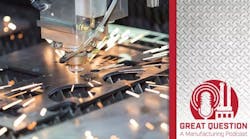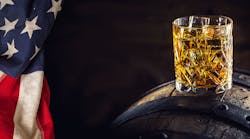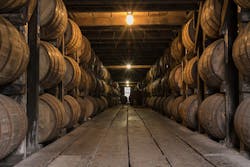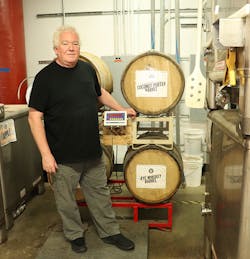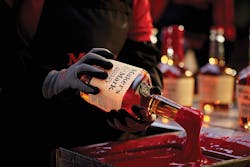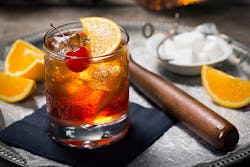When Tom Lix moved from Boston to Cleveland nine years ago, the serial entrepreneur was looking for a next act. He had flourished in the software sector, developing content creation applications for public broadcasting and a pre-eBay online auction program. Now he was soaking up news about the rising middle-class in China, and all the new "conspicuous" luxuries they could share generously with friends without spending too much, such as bourbon and scotch.
"That got me thinking about this [bourbon] industry that hasn't changed in several generations and what problems would occur because this could be a tsunami," Lix recalls.
The problem here is the most basic economic principle of supply and demand created by the strict distilling guidelines to earn the name of bourbon. Due to a 1964 Congressional declaration, bourbon can only be made in America, so Asia's nouveau riche thirsty for an Old Fashioned must import.
The copper-colored spirit must be at least 51% corn, fall between 80 and 125 proof, and most importantly, be aged in charred new oak barrels. Maker's Mark ages for six years, while Pappy Van Winkle's Family Reserve slumbers for 20.
"Unless you put your barrels aside six to 10 years ago, you're not going to have enough to cover what consumption levels would want to be," Lix realized.
But bourbon gets its distinct oaky notes from the wood housing it leisurely intermingles with during its confinement. So he got to work engineering a solution to speed up the process, turning his basement into a laboratory.
The winning proprietary process involves storing fermented corn, rye, and barley distillate in oak barrels to meet the minimum three-month aging standard, and pouring the "white whiskey" and cubed cuts of oak or other woods, into stainless steel reactors. Then the system cycles between pressure variations and oxygen infusion, which Lix likens to squeezing the liquid from a sponge and sopping it up again. The aggressive maturation process cuts nine years of waiting to 24 hours.
By 2012 he had a small distillery set up at a local manufacturing accelerator to produce the craft bourbon, sold under the brand name Cleveland Whiskey the next year.
Cleveland Whiskey has sold 300,000 (750 mL) bottles in the past five years, beaten nine-year-aged Knob Creek 54% of the time in 3,600 taste tests, and the company has started experimenting with small batches of black cherry, hickory, honey locust, and applewood in the reactors.
The company even found a novel use for the spent wooden blocks: as flavor-enhancing smoker wood for your next Mad Men-themed barbecue.
"We're not a craft distillery; we're really an innovation and technology company," says Lix, who employs 15 people. "We're making a lot of transformational whiskies that are different than anybody else's.
The small production space, where the company still operates, is mere blocks from Cleveland's AsiaTown. And breaking into the actual Asian market seemed closer than ever. A new full-scale facility was also in the works.
That was before the opening salvos of a potential full-scale trade war erupted in June, putting Lix's disruptive operation, as well as all American bourbon and whiskey distilleries great and small, on the front lines.
Tariff Terror
In retaliation for $34 billion in tariffs levied on various imported Chinese goods on July 6, China immediately responded in kind, with $16 billion follow-ups expected from each side. In June, in retaliation for Trump's tariffs on European steel (25%) and aluminum (10%), the European Union imposed 25% tariffs on imported whiskey and bourbon from the U.S.
Even before the tariffs went into effect, Lix's business had become a casualty of the global economic conflict.
"It sent a chill through our EU distributors," Lix says of the prospect of tariffs months ago. "Orders stopped."
Prior to these new tariffs, 85% of the exported American spirits to the E.U. were American whiskies, the American Craft Spirits Association reports. Overall, the market accounts for half of all exported U.S. spirits.
Lix says no one wanted to place a big order only to discover that the cost was 25% more than anticipated once it was on the other side of the Atlantic. Golden Moon Distillery founder Stephen Gould reported the exact same experience to Time in early June.
The fear is that the initial hike could be only the beginning of an exponential jump, as certain transportation costs and additional taxes could be added to the new base price. A bottle thought to sell for $40 to 50 could increase $60 to $80, Lix says.
Now he is worried once the current supply runs out, he will permanently lose the shelf space his bottles occupy. And he's left with a large order of 700 mL glass bottles, the European standard specially ordered from Italy and France.
"We are the ones in the deficit position," Secretary of Commerce Wilbur Ross told MSNBC in May. "That means they have more to lose at the end of the day than we do."
Making this a trade war of attrition doesn't sit well with Lix.
"I was a little shocked at that," he says of Ross' comments. "How did you decide which would benefit and which would hurt?"
Lix believes instead of tamping down foreign partners, the government should focus efforts on lifting up domestic industries to narrow the trade gap. He points to all the other American materials used to get a bottle of bourbon to other countries, from grains to glass (with the exception of the 700 ml bottles) to boxes.
"Why wouldn't you want to encourage me to export more of it?" he asks with a twang of exasperation. "If you're not going to do that, don't get in my way. That's what they've done; they've made it harder."
Homeland Job Security
Lix directly provides 15 jobs, which isn't a lot but adds up all the companies impacted by tariffs, and that could threaten 761,000 U.S. jobs, the Chamber of Commerce projects. Withdrawing from NAFTA could kill 1.8 million more. Canada and Mexico have also singled out American whiskey and bourbon, 10 and 25% respectively.
For Kentucky, which produces 95% of the world's bourbon supply, a prolonged trade war would be devastating. The Kentucky Distillers' Association (KDA), the industry's 138-year-old trade group, says the $8.5 billion bourbon industry supports 17,500 jobs in the commonwealth and brings in $825 million in taxes.
According to a U.S News & World Report ranking of the 50 states (based on McKinsey data), Kentucky sits at 48th in employment and 45th in the overall economy. Removing any jobs, particularly in a booming homegrown industry, would have obvious negative consequences similar to what happened in the Rust Belt when the steel industry first declined in the 1970s.
"We're still being cautiously optimistic," KDA President Eric Gregory says. "We're all holding our breath that it gets worked out sooner than later."
The KDA represents 33 companies, the most since before Prohibition, and Gregory says the global leaders knew this was coming and stockpiled reserves in countries before the tariffs went into effect. The bourgeoning craft distilleries, though, might not have the same ability.
"This could really have a trickle-down effect and not only hurt the bourbon industry's big players, but also the small players, the grain farmers, and the barrel and still making industries," Gregory says.
One factor adding a fuse to this explosive situation is that bourbon evaporates as it ages. Called the angel's share, this heavenly tithe causes a 2 to 4% loss in volume per year, depending on the climate.
So as overseas orders are canceled or never taken, distillers can only wait for a resolution as their product slowly disappears. A general sense of concern and frustration has swept through the Bluegrass State's distilleries.
The frustration is really a double shot, as bourbon has started to challenge the traditional international leaders.
"We have just scratched the surface of converting consumers overseas to bourbon in the past generation from scotch and Irish whiskey," Gregory says.
Taking into account higher prices and less availability, "people would revert to what they were drinking before or not be able to afford Kentucky bourbon," he adds.
Robbing Europeans and the Chinese of a decent Manhattan seems like their governments may be punishing their own people, but the general assumption is that, or "Art of the Deal" type maneuvering, or good old-fashioned spite, is the reason bourbon was selected as a tribute by the E.U.
"The fact that they targeted Wisconsin (and manufacturer Harley-Davidson) and Kentucky, I don't think it takes a rocket scientist to realize they are targeting [House] Speaker [Paul] Ryan and [Senate Majority] leader [Mitch] McConnell," Gregory says.
Blue jeans also made the list, with Levi's specifically mentioned European Commission President Jean-Claude Juncker. Levi Strauss & Co. and House Minority Leader Nancy Pelosi are both based out of San Francisco.
De-Escalation
The KDA has spoken with Vice President Mike Pence and keeps in daily communication with McConnell's office, though that cautious optimism may also be evaporating.
"We still don't see any movement in that direction and that's why we're frustrated," Gregory says.
Despite the frustration, a comparable nationwide boycott of Irish whiskey or Scotch might only hurt American companies more. Brown Forman, which owns Jack Daniels and Woodford Reserve, also owns Finlandia Vodka (made in Finland) and The BenRiach Distillery Company, which makes several Scotch whiskies.
"If we start getting into escalation and counter-tariffs, they're not only going to take one punch to the gut, they'll take five," Gregory says.
For now, the bourbon industry must be patient, a trait they are known for. But unlike with the smooth, belly-warming spirit, this trade war is only going to get worse.
Lix, a self-identifying heretic in his industry for taking a technological shortcut, just wants it to be over quickly and peacefully.
"This is an issue that affects both Democrats and Republicans, and I think we have to unite to somehow correct this," says Lix, who has hosted President Barack Obama and both Ohio senators at Cleveland Whiskey. "I don't believe you can win a trade war, despite what some people might believe."
It's not just frustrating for him, but downright confounding.
"Unemployment is low and things seemed to be going pretty well," Lix says. "I think we just threw a wrench in the process. This could start another recession or a global recession. Economies are sometimes fragile things."






